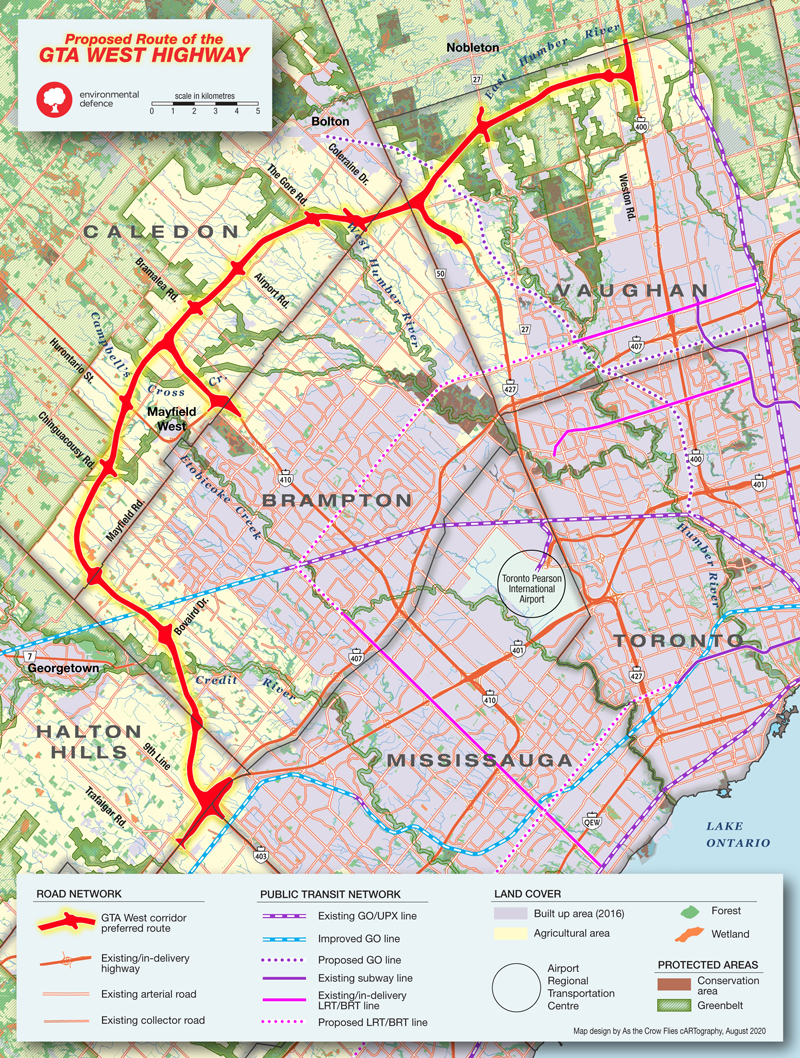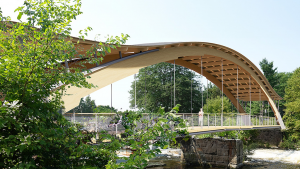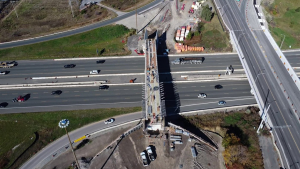Opposition is growing against a proposed 400-series mega-highway that would stretch roughly 52 kilometres from Vaughan to Milton.
A number of environmental groups and municipalities have joined the growing chorus objecting to the thoroughfare, known as GTA West Highway 413, because of the “disastrous” impacts it would have on habitat.
Municipalities such as Orangeville, Halton Hills and Mississauga have formally objected to the corridor. Others, such as the Toronto and Region Conservation Authority, Environmental Defence, Rescue Lake Simcoe Coalition and the Simcoe Country Greenbelt Coalition, are also opposing it because the route would go through agricultural areas and wetlands and lead to the destruction of some endangered species.
“This is a $6-billion-plus investment for a minor decrease in travel times,” explains Laura Bowman, lawyer for Ecojustice Canada, an organization that provides funding to lawyers using litigation to protect the environment. “The 407 is already built and already provides potential capacity to relieve traffic.
“The project would cut through prime farmland and greenbelt and would have potentially serious adverse effects on the environment which can not be mitigated relating to the destruction of wetlands, woodlands, a large conservation area and river valleys containing endangered species.”
The highway was cancelled by the previous Liberal government but has been revived under the Conservatives in an effort to improve the highway network and reduce congestion and travel times for truckers.
The corridor for the thoroughfare is an orbital beltway that stretches from Highway 400 between Kirby Road and King-Vaughan Road in the east, through parts of Caledon and Brampton to the Highway 401/407 interchange in Milton in the west. The roadway would run south of Bolton and Georgetown.

The City of Mississauga is the latest municipality objecting to the new highway. On Feb. 24, city council approved a motion to strongly oppose the construction of the thoroughfare.
“The proposed GTA West Highway will have a disastrous impact on the environment, encourage residential sprawl and increase our dependence on cars,” Mayor Bonnie Crombie said in a statement. “As a council, we’ve been so dedicated to trying to combat these issues, so we could no longer simply stand idle. Too many experts and organizations have come out against this planned highway, and today we stand with them.”
The motion will be shared with Ontario Premier Doug Ford and all members of provincial and federal parliaments.
Environmental groups, meanwhile, maintain the province is planning to weaken the environmental assessment process for the project which will prevent proper study and mitigation measures being taken prior to the start of construction, and exclude the assessments to consider the climate or healthy impacts of the venture. They want the highway to be subject to a federal environmental assessment.
“The province has proposed two separate possible exemptions for the project which could result in construction commencing before environmental studies are complete,” says Bowman. “It is worse than a slapdash approach. It is part of a sweeping and unprecedented environmental protection rollback.”
The groups maintain that Highway 413, as well as the Holland Marsh Highway proposed in Simcoe County and York Region near Lake Simcoe, will have significant impacts on endangered species, migratory birds and aquatic life.
The associated increase in carbon emissions and strong local opposition meet the conditions for federal EAs, according to the groups.
They have sent a letter to federal Environment and Climate Change Minister Jonathan Wilkinson, requesting that he designate the project for a federal EA. He is expected to respond by May.
“The provincial process is inadequate because there is no requirement for climate impact assessment, health impact assessment and to date both EAs, though they have been on the books for many years, have failed to assess impacts on terrestrial and aquatic species or water quality,” says Bowman.
The environmental groups want a federal EA because it would examine the potential impacts of the highways and determine if they are the most sustainable option to solve transportation problems in the GTA or if there are better, more sustainable alternatives that align with the federal government’s climate goals.
Environmental groups are also opposing the Holland Marsh Highway because it will cross through one of the most productive agricultural areas in the country, Greenbelt areas and important wetlands.
It is estimated the development will lead to the removal of approximately 39 hectares of wildlife habitat and large areas of important wetlands. The project would cause significant groundwater contamination and would put Lake Simcoe and the Greenbelt at risk, according to the groups.
The Holland Marsh project was shelved in the mid-2000s because it was incompatible with growth planning, but it has been resurrected under the Conservatives. The environmental groups want the federal government to request a comprehensive EA to address the impacts to human and environmental health.
Bowman says the proposed highway would bisect the Holland River wildlife corridor, permanently remove and alter large portions of the wetland and associated woodlands and cause severe stormwater and groundwater contamination from road salt and nutrients which will go into Lake Simcoe.
“The highway is a threat to Lake Simcoe protection and would destroy specialty crop lands in the Holland Marsh.”










I am in grade 5. I don’t want the highway. Keep the animal habitat safe.